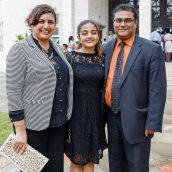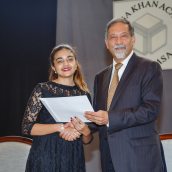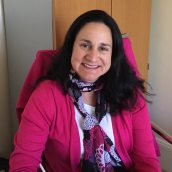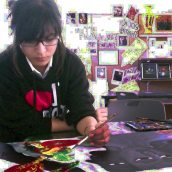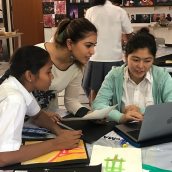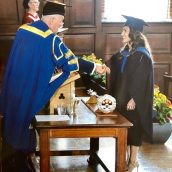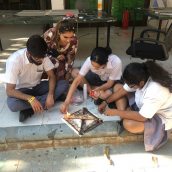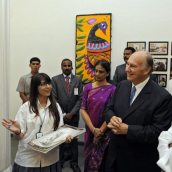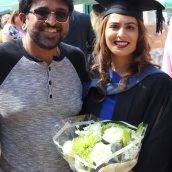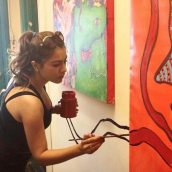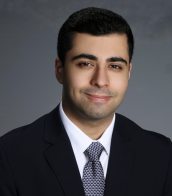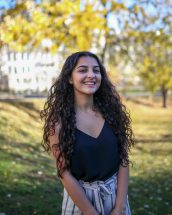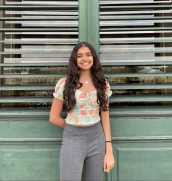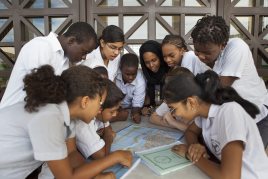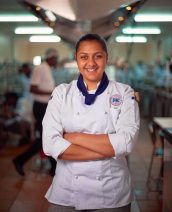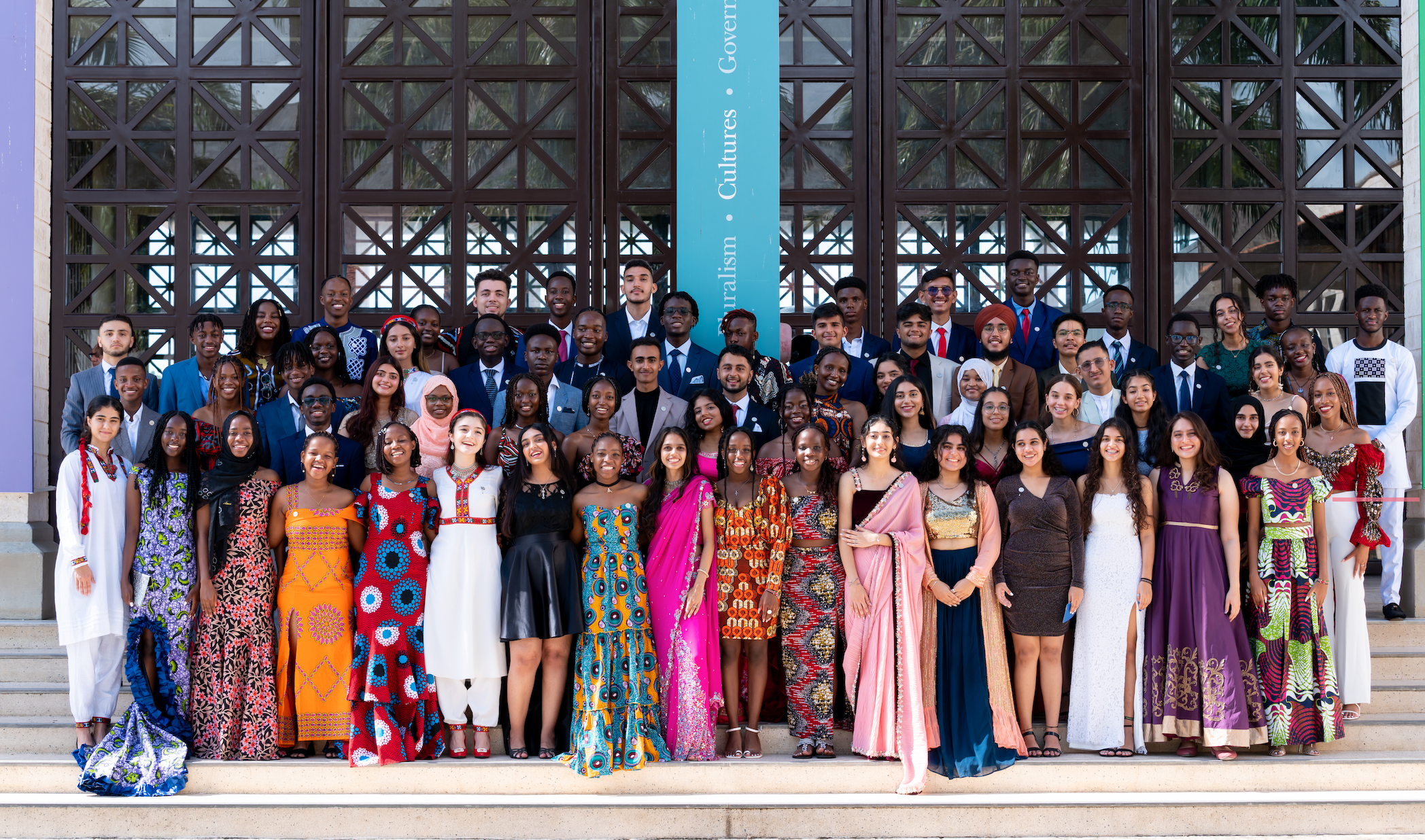At the Aga Khan Academy Mombasa, Ham Serunjogi – CEO and co-founder of African fintech giant Chipper Cash – realised the importance of staying connected to something larger than himself. The Forbes 30 Under 30 honouree is now serving as an advisor to the US President on African diaspora engagement.
The Times of India: Civil society has to be driven by competence as well as ethics: Aga Khan
In light of the inauguration of The Aga Khan Academy, Hyderabad, The Times of India reporter Ranjan Roy interviews His Highness the Aga Khan and focuses on his unique and forward thinking vision, which includes ethics, free-market economics, and civil society as essential elements of a well-rounded education.
Mukhi Family: Cherishing the Academy's nurturing environment
“Through our chain of observation, the Aga Khan Academy Mombasa surely plays an active role in the holistic development of every child. This is our consistent finding all through the two years of IB Diploma programme our daughter studied. This two-year journey at Aga Khan Academy Mombasa was fully laden with profound experiences that we cherish, as we have eventually seen our daughter progress in all domains of development.”
Faliha Altaf Mukhi graduated from the Aga Khan Academy Mombasa in 2017 with an International Baccalaureate Diploma and is now pursuing her Bachelor’s degree in Global Business and Digital Art at the University of Waterloo, Canada. Faliha's proud parents, Aneela and Altaf Mukhi, are very happy with their child’s experience at the Academy. “The overall progress that we have seen in her is outstanding, both academically and non-academically!” they exclaim.
Faliha’s parents reside in Kampala, Uganda. Enrolling their daughter at the Aga Khan Academy, they say, was one of their best decisions. They feel that the educational experience provided by the Academy is exceptional, in the Eastern African region and beyond.
According to her parents, Faliha was able to take advantage of a number of development opportunities during her two years at the Academy. For example, she was the president of the Green Gang, an environmental protection endeavour, and was also involved in reporting for the school's website. In addition, Faliha participated in several information technology projects such as database creation and graphic design – she designed certificates, logos and marketing materials. “This experience at the Academy contributed tremendously towards her dream career in digital art. Through the Academy, she also had an opportunity to intern at the Aga Khan Foundation Uganda which further increased her IT skills and leadership capacity,” her parents mention proudly.
“The Aga Khan Academy Mombasa is modern and well informed in implementing an effective educational approach,” say Aneela and Altaf. They particularly appreciated the communication facilitated by the Academy through which parents are kept up to date on the curriculum, activities, assignments, results as well as overall performance. “This regular monitoring through effective means of communication helps the parents to take immediate action and ask for assistance from the very cooperative and talented teachers,” they comment.
For Faliha’s parents, the Aga Khan Academy helped tap into the hidden talents and potential of their child. “The day we were informed by our daughter’s mentor that she had successfully led her team towards their destination on their mountaineering adventure on Mount Kassigau, we felt very proud indeed! It made us reflect on her perseverance, leadership and analytical ability for problem solving. These innate abilities, somehow, remained subdued before this experience at the Academy,” they note.
“I can happily say that the Aga Khan Academy Mombasa expresses all the traits of a learning community with all stakeholders having shared values and vision. Students at the Academy are active participants in learning... Such an environment truly nurtures them fully,” says Aneela. Moreover, Faliha’s parents find the systems at the Aga Khan Academy Mombasa to be well organised, and they commend: “Residential and academic, both sectors are remarkably performing to the best of their ability. Well done all!”
Theresa Urist: A passion for education
An Interview with Theresa Urist, Global Director of University Counselling at the Aga Khan Academies
Theresa Urist has always loved to learn. Growing up in a rural community in New York state, where many of her classmates did not go on to college, her thirst for education led her to Stanford, where she earned a B.A. with Honours in American Studies and tutored high school students in her spare time. She realised that she loved teaching as much as she loved to learn, so she secured a spot in the Master of Education programme at Harvard University before becoming a high school teacher and, later, a university counsellor.After more than two decades as a counsellor in the United States, where she directed college counselling at three different schools, Theresa’s desire to support students from poor communities led her to the Aga Khan Academies, where she became the Global Director of University Counselling in 2015. Her role is essential to the mission of the Academies, which aim to produce effective, ethical leaders with the skills and knowledge to support positive development in their societies. As the networks’ university expert, she coordinates the university counselling process so that the students are admitted to and select universities where they will flourish in their chosen fields.
Aga Khan Academies writer Alia Dharssi sat down for a conversation with Theresa about her passion for education, her work at the Academies and what makes her tick. Their conversation has been edited for clarity and length.
Alia: Can you tell me about yourself and how you wound up becoming a university counsellor?
Theresa: I was born and raised in a very small town on Long Island in New York State. I wanted to be a journalist as a kid and wound up writing for my college daily newspaper, where I had a 1am news deadline. It was crazy and frenetic. I realised that’s not what I wanted to do, but I had also begun tutoring at a nearby school and I really, really loved working with the students. That experience put me in the direction of education. I earned a Masters of Education from Harvard and became an English and history teacher. In 1995, I answered the call to become an interviewer for Harvard undergraduate admissions. I loved talking to students about their future plans and goals during the interviews, so I put the pieces together and entered the field of university counselling.
Alia: What makes you passionate about education?
Theresa: The way I see it, education is the key to social mobility. When students – like the ones on full financial aid at the Academies who are selected through our talent identification programme – become educated, it’s something that doesn’t just benefit them. It benefits their family and their community and has a ripple effect. I see it as a way that entire communities can get themselves out of poverty in one generation. Education is the most concentrated way you can effect lasting social change. That’s what gets me up in the morning every single day to do the work that I do.
Alia: Have you always thought about education in this way?
Theresa: Education is always something that has been at the forefront of my mind. My parents were well educated, but I grew up in a very rural community where a lot of people had not studied beyond the secondary level. So, when I went off to university at Stanford 3,000 miles away from home, it was an eye-opening experience. I was surrounded by very motivated people with a lot of interesting ideas. I had been a big fish in a little pond in my secondary school because I was somebody who was very hungry for education. I tried to access a lot of educational opportunities despite the fact that I attended a regional, rural public high school that did not offer the most enriching academic experience. College was the first time in my life I was surrounded by students who had had very different life experiences, who had gone to schools that were very academically rigorous, who were incredibly curious. It was vibrant and transformative.
Alia: That sounds like an amazing experience. You started working at the Academies after two decades of working as a counsellor in the US. What inspired you to take the job?
Theresa: When I heard about the job, it seemed like a perfect fusion of my interests. The mission of the Academies in terms of providing educational opportunities for students regardless of their means is one that spoke to my heart. In two decades of counselling, I had gone from working in college prep, private schools to working at an urban public school with very low-income students. There are so many talented kids whose socioeconomic background prevents them from accessing very good academic opportunities in places where they’re going to flourish. And so, in my own job search, I was looking for an organisation that provided such opportunities for students in need. I was also interested in international education – in addition to being a US citizen, I’m also a Swiss citizen and I’ve spent a good amount of time overseas – so this position really spoke to me.
Alia: What kinds of struggles have you seen students from poor socioeconomic backgrounds face when it comes to getting a good education?
Theresa: In my last role in the US, I was working in an urban public charter school with low-income students from all over the world. The majority of my students were first generation, meaning their parents had immigrated to the US. They did not speak English at home and they would be the first in their families to access higher education. I helped them navigate the system. Many of their families came from countries where poverty was a problem. Just getting to the US was a big hurdle. In addition, education is very, very expensive in the US, so it was a challenge for those students to figure out how to finance their education.
Alia: That sounds quite different from your role at the Academy. How do the two experiences compare?
Theresa: I certainly have a lengthy background in university counselling, but when I was based in one single school, it was quite limiting in a lot of ways. My work at the Academies requires a much larger scope in terms of finding what universities are a best fit for particular students. I had good working knowledge of US and Canadian schools coming in. What’s newer for me is some of the other schools beyond that, particularly schools in the UK. It’s given me a greater global perspective on education in terms of the different programmes that exist and the ways in which universities are trying to position themselves globally.
Alia: Can you tell me about your trips to the Academies? What was your first impression?
Theresa: My first visit was to Hyderabad. I found the students compelling and the facilities stunning. Everything exists in the service of students and forwarding their academic and personal growth. When I first made a visit to the Mombasa school, I found the level of arts that students were doing and the level of introspection that went into what they were creating was incredibly deep and heartfelt. It was more advanced than what I’d seen at other schools. A lot of the students’ art projects dealt with issues of social justice and presented very clear messages that made me hopeful. Seeing that level of attention given to something that is often peripheral at other schools speaks volumes about the Academies.
Alia: Absolutely. Why is your role important to the Academies’ vision?
Theresa: As we grow as a network, we want to make sure we are offering a consistent quality of university counselling services across campuses, so that’s a really important part of my work. We want colleges and universities across the globe to know who we are and why they should admit our students and fund them, so a big part of my job is conducting outreach to universities and colleges. When a university takes a risk on a student and that student does well, then it knows that it has a viable academic candidate and will admit more and more students from our schools. My job is to try to create pipelines for students at academically rigorous universities that recognise who we are and why our students are so interesting and compelling.
I also conduct some professional development like workshops for faculty members where they receive training about best practices for writing recommendations for students. Both campuses are now on the Naviance platform, which is an online portal that allows students to track all their applications and send documents to universities electronically. We also track data on the admissions process on the platform.
Alia: That’s important work, but now for a less serious question. What do you do when you’re not busy counselling?
Theresa: I love to cook and bake. In particular, I like making fancy cakes and tortes. Every year, during the holidays, I create a gingerbread house. They’re not basic ones; I have architectural plans. Last year, I made a church with candy stained glass windows. The year before, it was a Victorian house. Every year I do a different structure.
Alia: That’s quite a hobby. Do you eat the houses?
Theresa: Yes, eventually I do. My friend’s kids help me decorate the house, it stays up and then it gets destroyed. So that’s one of my hobbies. To balance my baking interests, I was a distance runner and had run a bunch of marathons, but I had to stop after an injury. But I still really like to be active. I like hiking and skiing and being outside.
Alia: Is there anything else you’d like to say?
Theresa: I love the work I do. I feel like mine is a really important role, so I’m just very grateful for the opportunity to work on behalf of the Academies.
Taniya Dharani - alumna returned as visual arts fellow
“The Academy has made me the person I am today,” she says. “I wanted to give back to the Academy what it has given me.” After graduating from the Diploma Programme, Taniya went on to pick up a Bachelor of Arts from the University of Reading, England. In her current role at the Academy, Taniya wants to help visual arts students prepare for university level art courses. It’s also on her agenda to introduce art students to careers in their field that they might not have considered.
“I want to help give our Diploma Programme art students theoretical practice that will be useful at university,” she says. “I also want to help visual art students understand what opportunities the art world outside holds for them; artistic pathways they can opt for including business and law options in sectors that not everyone is aware of.”
Though she has her task laid out in front of her, returning to the Academy in her new role is understandably strange for Taniya. “I still feel like a student at heart,” she says. “But I’ve learnt to act like a teacher and take responsibilities.” Taniya understands that her experience as a student at the Academy puts her in a unique place of understanding in her current role as teacher. “I feel privileged to have the opportunity to see Academy life from a different light this time. Now I understand the day to day challenges teachers face, as well as the hardships of student life.”
Taniya fondly remembers her time as a student at the Academy. When she graduated, Taniya was the only student in the visual arts department. “I really enjoyed visual arts in school. Being the only student, I had the entire art studio and Ms. Meenakshi to myself.” She is referring to Meenakshi Joshi, who is now MYP coordinator in the Senior School. She also remembers history classes with Koel Ray, and service opportunities at old age homes and government schools that taught her humility and empathy.
However, her most cherished memory at the Academy is meeting His Highness the Aga Khan. At the inauguration ceremony of the Academy in 2014, Taniya had the opportunity to show and discuss her art work with HH. “It was the most precious gift that I ever received and a memory that has helped me hold onto my passion.”
In her personal life, Taniya cites her father as her source of inspiration. It is a common trope that parents discourage their children from pursuing a career in the arts, but this wasn’t the case for Taniya. “Despite people not understanding my passion for painting, he [Taniya’s father] always stood by me and helped me achieve my goals,” she says. Taniya is also proud of her father’s efforts in community service and the life he has led. “His struggles and achievements inspire me. It makes me want to do great things.”
“Growing up I realised that the only thing that ignited a fire in me was holding a paintbrush in my hands and dropping paint all over my clothes. It made me feel like all is well in my world, even when almost everything in life was falling apart.” Taniya is in some ways a time capsule from the Academy’s early years, and like a time capsule, she reminds us of things that have changed, and also about the things that have remained the same.
Written by Ajay Sundaram
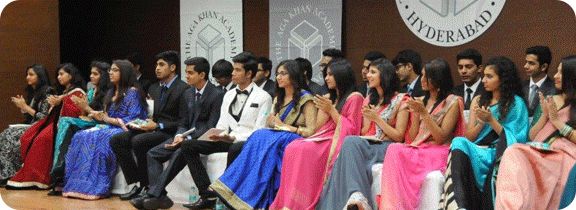
The vision for Aga Khan Academy graduates
Education at its best facilitates positive growth in all domains – intellectual, social, physical, ethical and spiritual – leading to the well-rounded development of the child. The Aga Khan Academies aim toward this ideal, and the values they espouse are reflected in each school’s aspirations for its students.
Students at an Academy pursue a well-balanced education combining intellectual inquiry, academic excellence, sporting and cultural activities, and a grounding in ethics and moral reasoning
They are committed to rigour and self-discipline in their studies and subscribe to the principles of intellectual honesty in the preparation of their work.
They respect their teachers and fellow students. They extend their respect to the cultural, religious and political convictions of others in school and in society. They dedicate themselves to debate issues honestly and fairly. They aim to understand and recognise the value of other views even as they value their own.
They are self-aware and socially conscious. They are committed to the development of their communities, their nation and civil society in the world at large. They are motivated to help others less fortunate than themselves.
They strive to acquire knowledge as part of a balanced, lifelong process of inquiry that leads to intellectual and personal growth, as well as a means to fulfil material goals.
The mastery of a particular discipline is balanced by a broad knowledge of several subjects, including science, art, literature and music.
They are also citizens of the world and at ease in environments and settings other than their own. They are generous and tolerant towards other cultures and traditions.
They are bilingual or multilingual.
They embrace the rich diversity of the world while valuing their own identity.
Read more here.
Interested to know more about our graduates? See spotlights on our alumni
Alumni
Education at its best facilitates positive growth in all domains – intellectual, social, physical, ethical and spiritual – leading to the well-rounded development of the child. The Aga Khan Academies aim toward this ideal, and the values they espouse are reflected in each school’s aspirations for its students.
The vision for Aga Khan Academy graduates
Students at an Academy pursue a well-balanced education combining intellectual inquiry, academic excellence, sporting and cultural activities, and a grounding in ethics and moral reasoning.
They are committed to rigour and self-discipline in their studies and subscribe to the principles of intellectual honesty in the preparation of their work.
Read more here.
The Aga Khan Academy Alumni Network
Fill out the AKA Alumni online questionnaire here
Connect with us via our Facebook and Instagram pages.
Interested to know more about our graduates? See spotlights on our alumni
Fatema Sheikh (Class of 2012): Advocating Educational Equality
Fatema Sheikh carries the lessons she learnt during her time at the Aga Khan Academy Mombasa with her to date.
Fatema joined the Aga Khan Academy Mombasa community in 2009 and graduated in 2012. She is currently pursuing a Bachelor of Science in consumer behaviour and marketing at the University of Reading on a full scholarship – an achievement for which she appreciates the support she received at the Academy through university counselling. She has had a colourful university career so far and hopes to graduate with her degree in the summer of 2015.
In the summer of 2013 after her first year at university, Fatema underwent a three-month internship with Champions Life Academy – an organisation which recruits and trains undergraduate students from universities to raise funds for various charities.
“This internship appealed to me, especially because it was related to my course of study as well as being able to support a worthwhile cause.”
She raised funds for a charity called Action for Blind People.
“This internship strengthened a lot of my skills, such as communication, negotiation and time management as well as improving my people skills tenfold. I am now able to approach and communicate with anybody.”
In addition to the work she did over the summer, Fatema was also heavily involved in various community activities through the university’s RED Award scheme.
Currently, she spends her time as a volunteer working with special needs children. Her desire to get involved with something like this was sparked during her time at the Academy in Mombasa. As part of her creativity, action, service (CAS) component of the Diploma Programme (DP), she spent time working with children in the special support unit of the Junior School, helping them with one-on-one or small group sessions on areas such as reading and comprehension.
“As difficult as it is, it is equally rewarding. When you get the child to enjoy what they are doing and play a part in helping them learn, it is very fulfilling.”
One situation she reflects on is her success in working with a student with several impairments, such as delayed speech, hearing impairment and a slight problem with balance.
“Helping and encouraging her made me feel like I was contributing to her understanding of various concepts," she says. "Working with children is always a two-way thing – they teach you as much as you teach them.”
In the past, she has also been involved in cultivating a garden at a school as well as volunteering at a family church in Reading during Christmas.
Fatema also places great worth on the advice she got from the Academy in preparation for university.
“My experience at the Academy could not have prepared me for life at university any better. While at the Academy, I was immersed in a diverse and multicultural environment which allowed me to adjust relatively easily to university where I was and still am constantly meeting people from different backgrounds.”
Having studied in this environment made her more open-minded and accepting of other people, and that has contributed to her being able to make friends and interact with people more easily. She also reflects on the value the International Baccalaureate (IB) DP added to her education.
“Deciding to do the IB DP is probably one of the smartest decisions I have made. I feel that the work ethic and skills such as time management required to do the programme have prepared me to take on any challenge.”
However, it was not just the academic component of the programme that pushed Fatema to stretch her limits. The DP's CAS component requires students to be actively involved in extra-curricular activities, and the theory of knowledge lessons encourages students to think critically in all disciplines. She commends both these aspects of the programme for instilling values in her that have become intrinsic to the way she lives her life.
“It made me into a more well-rounded and holistic individual,” she says. “It prepares you for life outside of school and makes you think about things that would not cross your mind or that you normally would not consider important. My ability to think and analyse situations critically has improved significantly due to constantly being challenged throughout the programme.”
Fatema has also been able to think about the time she has spent away from home and how her experience at the Academy prepared her for life in a new environment. The abundance of the AKA Mombasa alumni at the University of Reading was a part of that, and she was able to form connections quickly within the community. She also felt that the Academy offered education and opportunities just as good, if not better, than the schools in more developed places such as England, which made it very easy to transition into the unfamiliar environment.
“The Academy and the IB encourages independent thinking and this served me well since it was the first time I was living away from home for a long period and where I would have to make a lot of decisions on my own.”
A lot of Fatema’s involvement in her local community at university is inspired by the ethics she picked up at the Academy. One of the projects of which she is particularly proud is an outreach programme she conducted while interning for the Kenya School Improvement Project (KENSIP) as part of the Aga Khan Foundation internships offered to DP students at the Academy. She visited rural schools and worked with the adolescent girls there towards educating and counselling them on the day-to-day challenges faced. Initially, she focused on identifying the key issues to be tackled and then tried to come up with a way in which sensitive issues such as abuse, early pregnancy and the menstrual cycle could be approached.
“I formed a very close bond with the girls I worked with as well as their teachers. I truly felt like I helped to make a difference and taught them something worthwhile. Although I spent most of my time with the girls, I also included the boys and led forums which discussed issues such as bullying and drug abuse.”
As part of her outreach project, she worked to raise awareness in local rural communities about equal education opportunities for both boys and girls.
Fatema's commitment to providing education opportunities remains strong to this day. In particular, she feels passionate about eradicating gender inequality when it comes to education in rural parts of the world. Her work with KENSIP highlighted the need for equal education for boys and girls as the key to future development.
“It is only through education and knowledge that the current and future generations can flourish. I believe the key to breaking the poverty cycle is improving education opportunities. So, if I had all the resources at my disposal, I would advocate for the importance of the girl child being allowed to attend and stay in school.”
Hour of Code: 4th - 10th December
Grades 1-12 students & all staff will be given the time and opportunity to create their own fully functional computer programme during Computer Science Education Week!
Mwanapwani Said: Inspired to make a difference
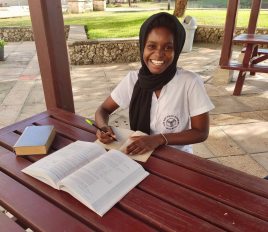 Year 10 student Mwanapwani Said, who comes from Msambweni in Kwale County, joined the Aga Khan Academy Mombasa in 2017 on a full scholarship through the Talent Identification Programme (TID). This programme is developed in line with the Academy’s vision to provide exceptional students with an international-standard education and leadership opportunities, regardless of their ability to pay.
Year 10 student Mwanapwani Said, who comes from Msambweni in Kwale County, joined the Aga Khan Academy Mombasa in 2017 on a full scholarship through the Talent Identification Programme (TID). This programme is developed in line with the Academy’s vision to provide exceptional students with an international-standard education and leadership opportunities, regardless of their ability to pay.
When she first received the news that she had been accepted to the Academy, Mwanapwani was elated and thankful. She was excited about studying under the Academy’s unique and holistic curriculum because she knew it was going to be a life-changing opportunity that would open many doors for her.
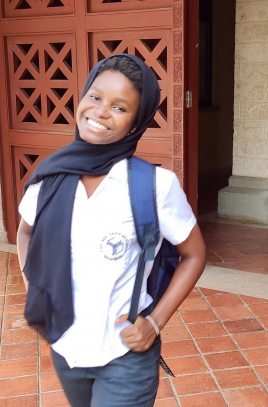 “I felt so grateful about receiving a full scholarship because it greatly reduced my financial burden. I became more driven than ever to create a fully rewarding experience for myself,” Mwanapwani said.
“I felt so grateful about receiving a full scholarship because it greatly reduced my financial burden. I became more driven than ever to create a fully rewarding experience for myself,” Mwanapwani said.
Having been at the Academy for nearly four years now, Mwanapwani has availed herself of every opportunity to strive for the better. Her growth has been reflected in academics as well as sports, where she has picked up a passion for football. In addition, being selected to participate in the Exchange Programme with AKA Hyderabad exposed her to a new culture, one that enabled her to gain an understanding of her identity and values whilst appreciating the varying perspectives of others.
Commenting on how the Academy has shaped her outlook on life, Mwanapwani stated: “The Academy has changed me for the better as I now know more about myself. Learning to have a pluralistic approach has taught me to be respectful of the opinions and values of others. I have also learnt to work well with others because I believe great things can be achieved when we work together and I feel like this is an important aspect that will help me in the future.”
"Mwanapwani is a very cheerful and conscious student. She is upbeat about life and hardly sees challenges as hurdles, but rather as trophies on her way up. Having been selected from TID, she has proved her mettle over the years in her Middle Years Programme. She is all-rounded, self-driven and radiates an aura of confidence around her peers. I consider myself fortunate to be around this positive personality," said Head of Residential Life Benson Wafula about Mwanapwani.
An aspiring health professional, Mwanapwani’s vision is crystal clear. She is duty-bound to make a difference.
“I feel like I have been prepared for the real world, to be mindful of others and to give back. I want to work hand in hand with members of my community to make a change in society.”
Samantha Caras: Pioneering new approaches to University Counselling
Samantha Caras is from Southern California in the United States and has worked as a University Counsellor at the Aga Khan Academy Mombasa for four years. Her budding journey first began in India where she worked as an Academy Fellow for a year at the Aga Khan Academy Hyderabad supporting the leadership curriculum, helping out with college essay writing and teaching yoga before embarking on her role as a University Counsellor.
During her five years with the Academies, Samantha said her work changed the trajectory of her professional and personal life.
“It showed me that small opportunities, like being sent to a conference can change the course of your life,” Samantha said.
After being mentored in AKA Hyderabad, Samantha set out on a whirlwind experience at AKA Mombasa as a full-time University Counsellor.
“Coming to Mombasa has been exciting because I was able to have a lot of ownership over my work and could structure the office however I wanted,” Samantha said. “The flexibility and creative license I was given allowed me to build and restructure the university counselling programme to fit the diverse needs of our students.” She also said she enjoyed being immersed in many cultures, owing to the diversity of the school, and making friends from all over the world has helped her gain an overseas family for life.
Samantha said what she will miss the most is working closely with the students on their essays, being a part of High-achieving, Low-income (HALI) Access Network (an association of non-profit organisations in Africa that work with high-achieving, low-income students to access international higher education opportunities) and living in beautiful Mombasa. She also said she’s learnt quite a lot professionally, especially about the role of culture and background in higher-education advising.
During her time and position at the Academy, Samantha achieved quite a lot. On a personal level, she managed to finish her Master of Education in International Counselling Psychology, after which she got Minal Shah, the head of student support and well-being, to help her out with a professional internship. For the University Counselling office, Samantha managed to change the structure of the programme to include weekly lessons on topics such as writing a resume; professional communication; writing college essays; mock admissions game; applying for financial aid and scholarships; money matters; budgeting and cost of living abroad; adjusting to life after the Academy; and developed the presentations for these lessons. She also applied for the Academy to become a member of the HALI Access Network, which has increased its visibility and given it access to numerous resources and scholarship opportunities for the Talent Identification programme students over the past four years. Additionally, she contributed to the early drafts of what is now the University Counselling Handbook for the Academies network, set up the office’s social media page on Facebook, and worked with USA-based Ismaili volunteers to develop a sustainable standardised assessment test (SAT) programme for college admissions.
Minal describes Samantha as a warm, open and candid individual who worked well with the students.
“Samantha has built significant bonds with the students she’s worked with,” Minal said. “She always encouraged and pushed the students, who always appreciated her patience, honesty and sense of humour. I will miss working with her and her enthusiasm of making things right for the students. She will be a wonderful addition to any institution she joins.”
For her next plans, Samantha said she will be moving to Quito, Ecuador to work as the college counsellor at an international school.
“It was a difficult decision to leave Mombasa and the Academies, but I am excited for the new experience and to work on my Spanish language skills again,” Samantha said.
